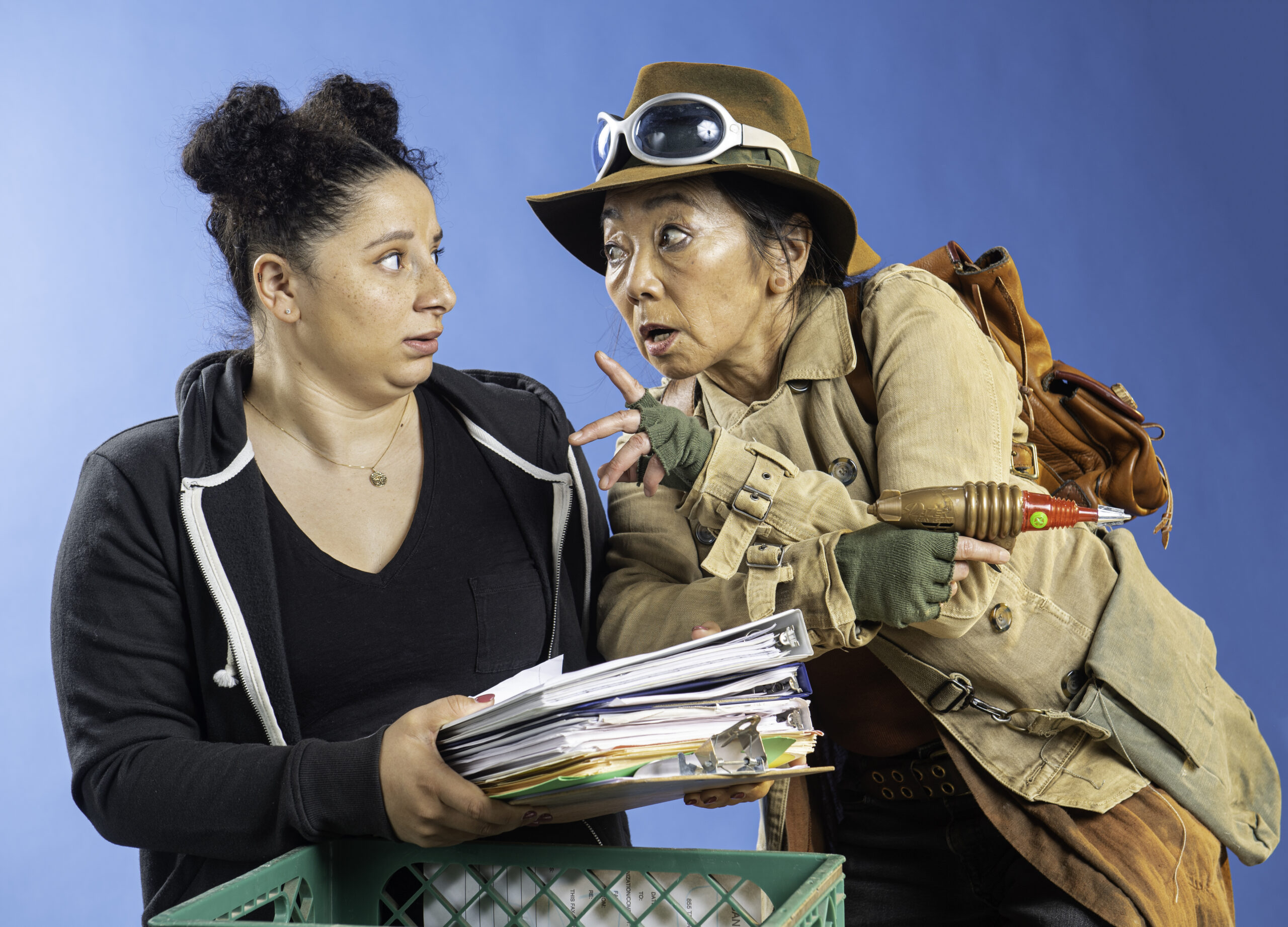In case you were wondering, the performers in the San Francisco Mime Troupe are not that kind of mime. Rather than feel their way around some invisible wall, they don colorful costumes and speak and sing—which is to say, they embrace the original definition of miming: the exaggeration of daily life in story and song.
After a two-year hiatus from live performances due to the pandemic, the group is back with Back to the Way Things Were, a free musical running through Labor Day in parks throughout the Bay Area. Tackling the widening generation gap in the face of global crises, the show pits parents Ralph (Norman Gee) and Alice (Lizzie Calogero), who want to return to the supposed bliss of pre-pandemic life, against daughter Zoe (Alicia M.P. Nelson), who sees a world that has always been screwed up. Antics ensue when Zoe befriends Book (Keiko Shimosato Carreiro), a trenchcoat-sporting time traveler who vacillates between savant and lunatic.
“The overall thing we want people to come away with is that we need to seize the moment while we still can,” music director Daniel Savio told The Standard. “We are heading towards a cliff. And we don’t want to go over it if at all possible.”
The history of the Mime Troupe dates to 1959, when RG Davis founded the company as an experimental project of the San Francisco Actor’s Workshop. The troupe’s mission is to present a working-class analysis of society’s events, which at times can feel more didactic than entertaining. The oversimplification of villains and presentation of pat solutions can verge on cartoonish, but that’s typical of political theater.
“We’ve been a part of the counterculture since the 1960s, always loud and proud and far to the left,” said actor Andre Amarotico, who plays six roles in the performance. “We’re keeping that part of the soul of San Francisco alive.”
Unapologetically socialist, the troupe features a communist red star in their logo and operates as a collective, with no titles.
“There’s no hierarchy, there’s no leader, we all have the same vote,” Savio said.
Performers play multiple roles and encourage audience participation—“I enjoy getting booed, because I know I’m doing my job,” Amarotico said—and the troupe employs race-conscious casting. Here are five takeaways from Back to the Way Things Were.
Gen Z Is Cynical
“This dumpster fire is all I’ve ever known,” says Zoe, who was born the day after 9/11 and doesn’t remember a time she didn’t have to take her shoes off to board an airplane. Beyond frustrated by her parents’ naive optimism, she longs to make a difference in the world. But her internship at a homelessneess center convinces her it’s all a dead-end strangled by either bureaucracy or capitalists. More than anything, she wants to be left alone.
The Before Times Weren’t So Great
Alice and Ralph insist things are trending upward. Both have jobs; both are vaccinated. “We have a president who is not as dumb as a two-dollar ham,” says Ralph. Yet as the show makes clear, there’s an avalanche of oppressive forces that have been at play for a long time in San Francisco: racism, sexism, capitalism, transphobia, climate change, mass shootings.
Work Sucks—If You Can Even Get It
As a previously unemployed casino bartender, Alice is (too) thrilled about her new job at a fulfillment center and the orange vest that comes along with it. Ralph shifts positions from bus driver to Uber driver and laments his old life: “It was easier dealing with psychos on a bus than neurotics in my car.” Ms. Olivia (Lizzie Calogero) defines unpaid interships as “the future hellscape of corporate wage slavery,” a line that elicited an audience chuckle. The fast food worker at McBurger in the Box gets paid crap working four people’s jobs by himself “to help burn up the planet,” but even that is better than Herbert’s plight. The ex-boyfriend of Alice is unemployed and on the street after his wife dies from Long Covid.
We’re on the Brink and the Time To Act is Now
The mysterious Book who time travels assures Zoe that “the future is not as bad as you think it is—it’s much, much worse.” This dire message is supposed to be a call to action rather than a disincentive. Yet after over an hour of warnings about the imminent demise of the world, the ending’s quick dash of hope with a side of togetherness feels disingenuous as a solution.
The Generation Gap Is Real—But Not Unbridgeable
Zoe and her parents, despite their initial distance, understand each other better by the end of the show. Zoe recognizes her fatalism is a dead end; her parents acknowledge that things are not—and never will be—normal.
“In times when life can seem daunting, art is a respite and a balm,” Amarotico said. “But it doesn’t have to be a distraction. It can be a direct interaction with what’s going on in the world.” With its loud, musical, in-your-face agitprop, the San Francisco Mime Troupe wants us to tune in, not drop out.
San Francisco Mime Troupe’s Back to the Way The Way Things Were, through Sept. 5 at various parks throughout the Bay Area, free.
